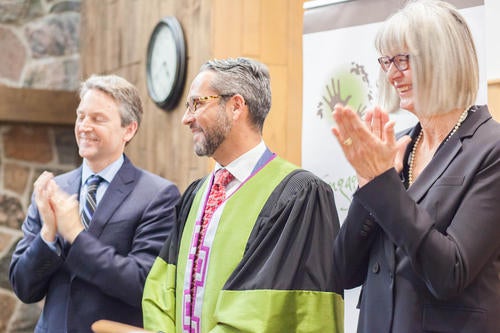
Mr. JP Gladu was officially installed as St. Paul’s Chancellor at an event in Alumni Hall on October 19. The event included a beautiful prayer delivered by Grafton Antone, a welcome song played by students and staff from the Waterloo Aboriginal Education Centre, and wonderful words of greeting from several members of the greater campus community.
The following is an interview with Mr. Gladu about his experience and his hopes for the future.
You started your career in forestry, then moved into business development. Now you're the Chancellor of a University College. Can you talk a little bit about that progression?
There's definitely a few steps in between! I'm the very first person in my family history to go beyond high school and that was because I wanted to be a conservation officer. After graduating from college, my first job was working for the federal First Nations Forestry Program, which had me visiting more than 40 Indigenous communities across Northern Ontario. That's when I fell in love with my community. I realized I had a calling to help First Nations meet the economic opportunities and challenges they're facing.
I recognized that if I wanted to make a bigger impact, I needed more education. That led me to Northern Arizona University, where I earned my BSc in Native American Forestry. When I returned home I joined the National Aboriginal Forestry Association in Ottawa and got my first exposure to working for a national organization.
After my daughter was born, I moved into consulting, including with my own First Nation, Bingwi Neyaashi Anishinaabek, while completing my MBA at Queens. In 2012, I was hired by the Canadian Council for Aboriginal Business (CCAB), and recently finished the Directors Education Program at the Rotman School of Business. Education is something that will continue throughout my life.
In my spare time, I'm training for a marathon and I spend a lot of time with my daughter, who lives with her mother in Ottawa. I'm so grateful for this life. Here's this Anishinaabe boy from Northern Ontario with very humble beginnings. And now I'm working with incredible organizations all over the country.
What prompted your decision to join St. Paul's as Chancellor?
I was approached by St. Paul's after I appeared on a panel on Aboriginal entrepreneurship with [former Prime Minister] Paul Martin and Mississaugas of the New Credit First Nation Chief Stacey LaForme. At first, I wasn't sure I could take on another responsibility. But I loved the ideas the Principal had for new programming in the area of Indigenous entrepreneurship. It's a game-changer! Couple that with the great work St. Paul's is doing with initiatives like GreenHouse and the question changed from "Can I say yes?" to "Why wouldn't I say yes?" This role is an incredible honour and privilege.
What do you see as the biggest challenges facing St. Paul's?
We need exposure. If we're going to develop more opportunities for Indigenous entrepreneurship, we'll need to build the networks to create a solid foundation.
In life — and business — it's all about meaningful relationships. St. Paul's is fortunate to already have many great relationships through its affiliation with the University of Waterloo. I plan to leverage my connections with leaders like Jim Balsillie, a mentor of mine who's been incredibly supportive of the work of the CCAB. I'm going to do whatever I can to help raise the profile of St. Paul's nationally.
Secondly, everyone at St. Paul's is already doing great work. The challenge is that we all have a ton on our plates. But as I meet with [Principal] Rick Myers and his team, I can see there's no lack of passion here. I believe that if we surround ourselves with people who get what we're doing, we can bust through these challenges.
One of St. Paul's values is a commitment to diversity. What aspects of Anishinaabe culture do you think particularly apply to research, teaching, and learning at St. Paul's?
First Nations culture is about connections to Mother Earth and connections to community. Indigenous peoples around the world are often seen as caretakers of the land. We're not opposed to development but we believe in doing it in a way that's as responsible and sustainable as possible.
I think we can all use more of those connections to the land and each other. And bringing those innate principles, and having more Indigenous people participate in programs like the ones at St. Paul's, will only strengthen the outcomes for everyone. You know that saying, 'The world needs more Canada'? I think Canada needs more Indigenous.
How can alumni best support St. Paul's focus on Indigenous education and social entrepreneurship?
Engage. Engage. Engage. Whenever you can share information, meet the people, talk about the issues.
I was just speaking at an executive women's network event, and I was struck by how both women and Indigenous people face similar challenges in the corporate world. We need to recognize those challenges and educate ourselves so we can support each other.
There's a saying that the best time to plant a tree was a hundred years ago and the second-best time is today. Today at St. Paul's, we're planting the seeds of a stronger relationship with Indigenous communities. And that's outstanding.









